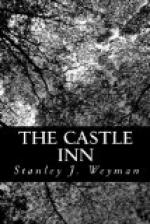But when he turned to seek them, he saw that they had stolen a march on him, that they knew it already and believed it! Between him and the tiny plot of grass, the urn, and the espalier, which, still caught the last beams of the setting sun, he surprised two happy faces spying on his joy—the one beaming through a hundred puckers with a mother’s tearful pride; the other, the most beautiful in the world, and now softened and elevated by every happy emotion.
* * * * *
Mr. Dunborough stood his trial at the next Salisbury assizes, and, being acquitted of the murder of Mr. Pomeroy, was found guilty of manslaughter. He pleaded his clergy, went through the formality of being branded in the hand with a cold iron, and was discharged on payment of his fees. He lived to be the fifth Viscount Dunborough, a man neither much worse nor much better than his neighbours; and dying at a moderate age—in his bed, of gout in the stomach—escaped the misfortune which awaited some of his friends; who, living beyond the common span, found themselves shunned by a world which could find no worse to say of them than that they lived in their age as all men of fashion had lived in their youth.
Mr. Thomasson was less fortunate. Bully Pomeroy’s dying words and the evidence of the man Tamplin were not enough to bring the crime home to him. But representations were made to his college, and steps were taken to compel him to resign his Fellowship. Before these came to an issue, he was arrested for debt, and thrown into the Fleet. There he lingered for a time, sinking into a lower and lower state of degradation, and making ever more and more piteous appeals to the noble pupils who owed so much of their knowledge of the world to his guidance. Beyond this point his career is not to be traced, but it is improbable that it was either creditable to him or edifying to his friends.
To-day the old Bath road is silent, or echoes only the fierce note of the cyclist’s bell. The coaches and curricles, wigs and hoops, bolstered saddles and carriers’ waggons are gone with the beaux and fine ladies and gentlemen’s gentlemen whose environment they were; and the Castle Inn is no longer an inn. Under the wide eaves that sheltered the love passages of Sir George and Julia, in the panelled halls that echoed the steps of Dutch William and Duke Chandos, through the noble rooms that a Seymour built that Seymours might be born and die under their frescoed ceilings, the voices of boys and tutors now sound. The boys are divided from the men of that day by four generations, the tutors from the man we have depicted, by a moral gulf infinitely greater. Yet is the change in a sense outward only; for where the heart of youth beats, there, and not behind fans or masks, the ‘Stand!’ of the highwayman, or the ‘Charge!’ of the hero, lurks the high romance.




